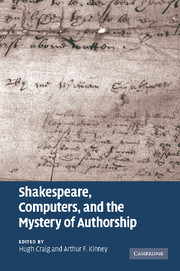Book contents
- Frontmatter
- Contents
- List of figures
- List of tables
- Notes on contributors
- Preface and acknowledgments
- 1 Introduction
- 2 Methods
- 3 The three parts of Henry VI
- 4 Authoring Arden of Faversham
- 5 Edmond Ironside and the question of Shakespearean authorship
- 6 The authorship of The Raigne of Edward the Third
- 7 The authorship of the Hand-D Addition to The Book of Sir Thomas More
- 8 The 1602 Additions to The Spanish Tragedy
- 9 Transforming King Lear
- Conclusion
- Appendix A Plays in the corpus
- Appendix B A list of 200 function words
- Glossary
- Index
- References
9 - Transforming King Lear
Published online by Cambridge University Press: 06 January 2010
- Frontmatter
- Contents
- List of figures
- List of tables
- Notes on contributors
- Preface and acknowledgments
- 1 Introduction
- 2 Methods
- 3 The three parts of Henry VI
- 4 Authoring Arden of Faversham
- 5 Edmond Ironside and the question of Shakespearean authorship
- 6 The authorship of The Raigne of Edward the Third
- 7 The authorship of the Hand-D Addition to The Book of Sir Thomas More
- 8 The 1602 Additions to The Spanish Tragedy
- 9 Transforming King Lear
- Conclusion
- Appendix A Plays in the corpus
- Appendix B A list of 200 function words
- Glossary
- Index
- References
Summary
Did Shakespeare or some other person revise the text of King Lear? Did that person or persons have second thoughts about the work published in Quarto (Q) in 1607–8, dropping or adding scenes, changing characterizations, and reshaping the play to transform the text posthumously published in the Folio (F) of 1623? Or was Shakespeare more concerned with the plays he was writing subsequently, no longer concerned about making revisions to earlier work, leaving that to other playwrights or to changes that evolved in performances? Anxious to preserve as Shakespeare's great work what has come down to us, editors of his plays through the centuries have fabricated yet a third text, conflating all the lines in both Q and F to avoid losing anything he may have written. But others have argued that such a union of texts is a bastard version of the play that does not represent authorial intention or accomplishment at any point of time. Questions about the text of Lear that remain, then, which computational stylistics can address, are these: (1) did one person (or more, as in performances over time) revise the play, and (2) was Shakespeare involved?
In 1930, E. K. Chambers listed the relevant texts beginning with the entry for the play in the Stationers' Register.
[S.R. 1607] 26 Novembris. Nathaniel Butter John Busby. Entred for their Copie under thandes of Sir George Buck knight and Thwardens A booke called. Master William Shakespeare his historye of Kinge Lear, as yt was played before the Kinges maiestie at Whitehall vppon Sainct Stephens night at Christmas last, by his maiesties servantes playinge vsually at the Globe on the Banksyde vjd (Arber, iii, 366). […]
- Type
- Chapter
- Information
- Shakespeare, Computers, and the Mystery of Authorship , pp. 181 - 201Publisher: Cambridge University PressPrint publication year: 2009



